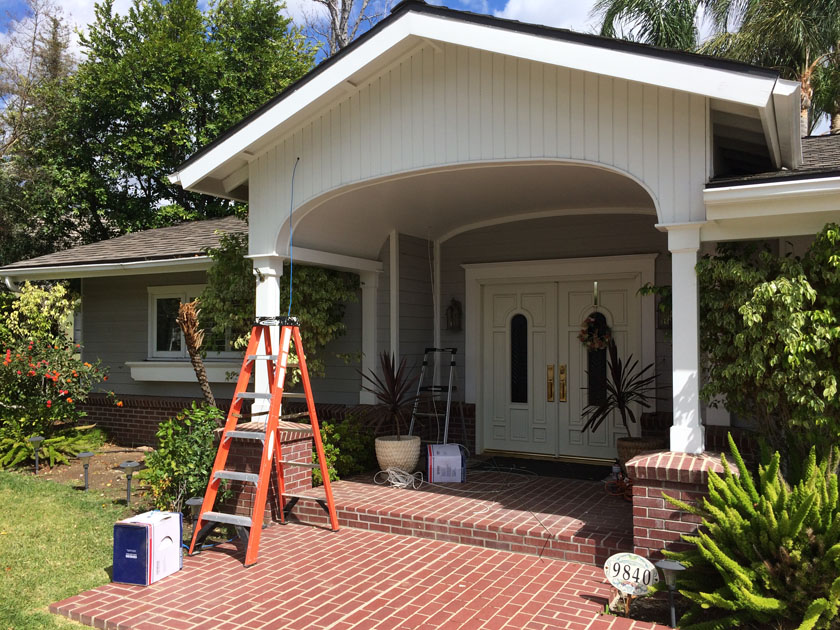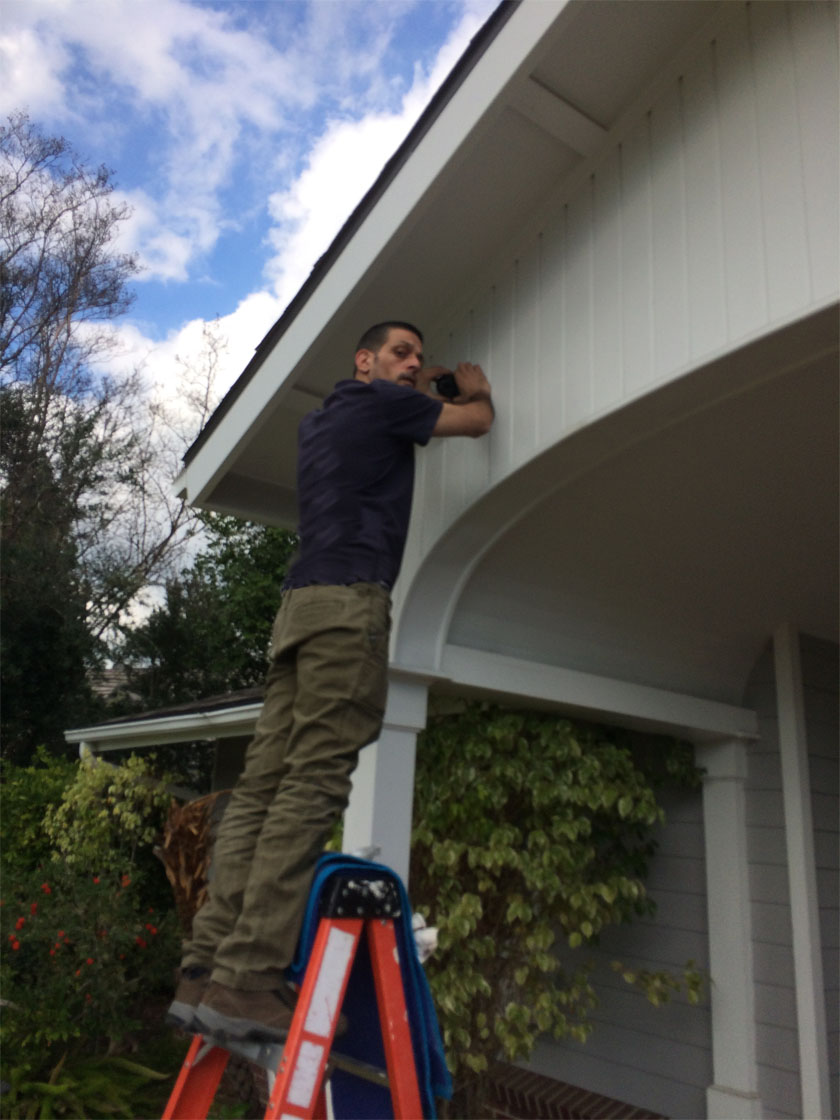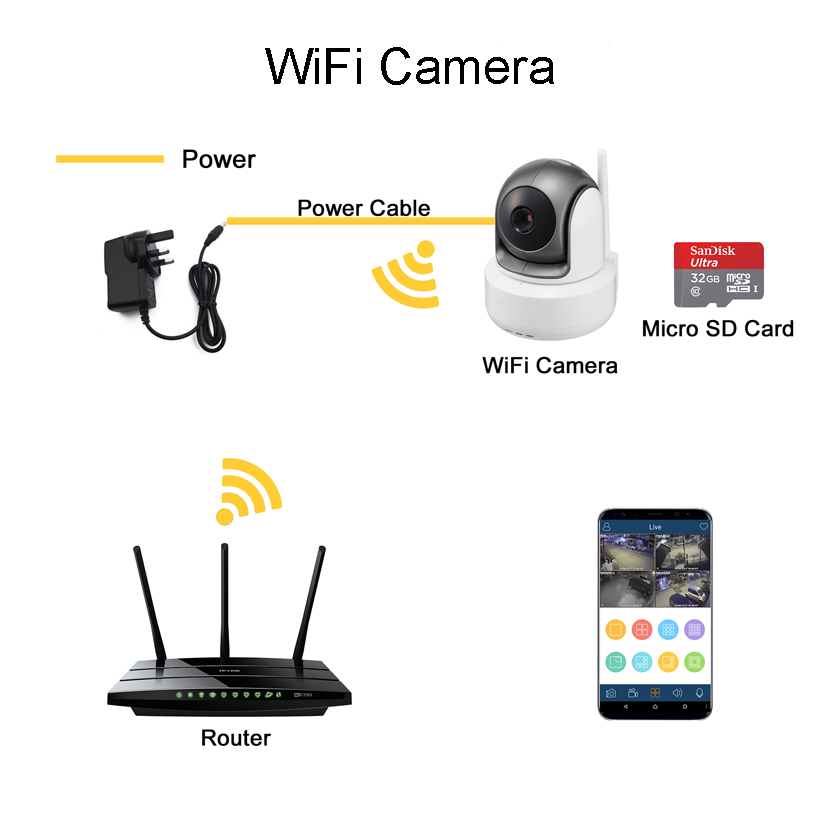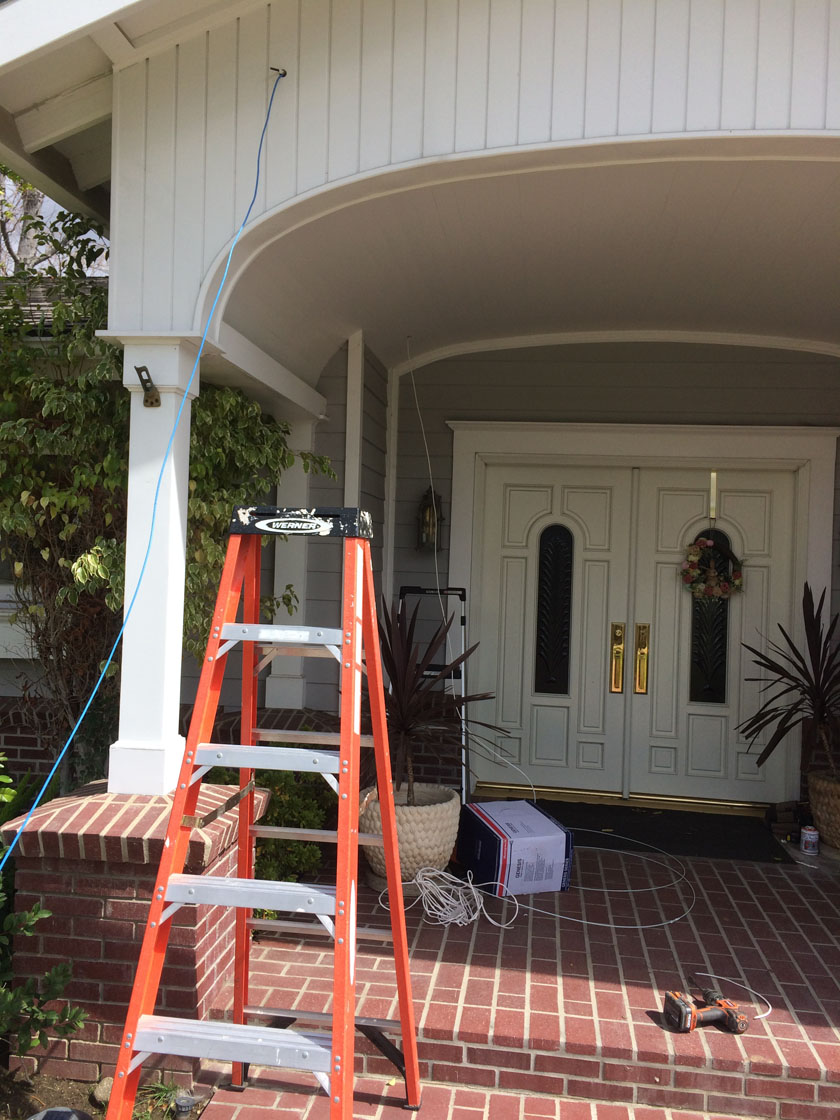
Wired vs. Wireless Security Cameras
October 20, 2019
By Leo bitOn
Security Cameras - the eyes in the back of your head
Out of all the places in the world, home is that one place where we should be feeling completely safe. Constantly keeping an eye on the things you care about, is nearly impossible. Even if you were at home all day long, you could'nt watch everything at all times. That's what a security camera system is for. The cameras capture events as they happen in real-time 24/7, and almost like actual guards, they help keepping the bad guys away.
Security Camera System - Extra layer of protection
Sure, the doors and windows locks in your home are making it a more safe and secure place to be, but sometimes, unfortunately, that's not enough. To protect your home better, additional layers of security may be necessary. Having systems like a security alarm and security cameras installed at your home or business can significantly increase your confidence and safety. A security alarm system, on its own, is an essential layer of protection. It's designed to warn about an occurring security violation, but is less effective as a crime prevention tool. A security camera system, on the contrary, has one of the most beneficial features, and that's deterrence. It's simply the best way to scare the thieves away.
Wired Security Cameras system - Overview
I could go on and on about the importance of having a security camera system, but I'm assuming that if you're reading this, you already understand the benefits of having one. So what's better? A wired security camera or a wireless security camera system? If you're not quite sure what will work better for you, keep reading and I'll walk you through the pros and cons of both wired and wireless security cameras systems and hopefully help you make the right choice based on your own security needs.
wired security camera system ?
There are two types of wired security cameras. The IP, (Also known as PoE IP camera or network camera), and its predecessor the traditional Analog camera. Each of those security camera require a different type of wire to transmit the video signal and to power up the camera.
NVR / DVR & Cloud-based Storage
The analog surveillance cameras are connected to a digital video recorder (DVR). In the DVR, the video footage from the cameras is recorded onto a built-in local hard drive and then converted from analog to digital. The data is stored on the hard drive in a FIFO base and is accessible for viewing from the security cameras app or a desktop computer.IP cameras connect to a Network Video Recorder(NVR). Since the IP cameras video footage is digitally recorded, the image quality is superior to analog cameras and deliver a video footage in 4K and up to 8K high-resolution, crystal clear image quality that's almost realisitic. The fact that the recorded video footage is stored on a local hard drive meaning that even if criminals cut your ISP (Internet Service Provider) internet cable outside the house, the cameras will keep recording regardless of internet connection interruptions. The video footage stays accessible on the NVR / DVR hard drive. Some IP security cameras can work standalone without NVR. The recorded video footage is stored online in the cloud storage on a remote server. Like most services online, an email account is required to establish your cloud based storage service.
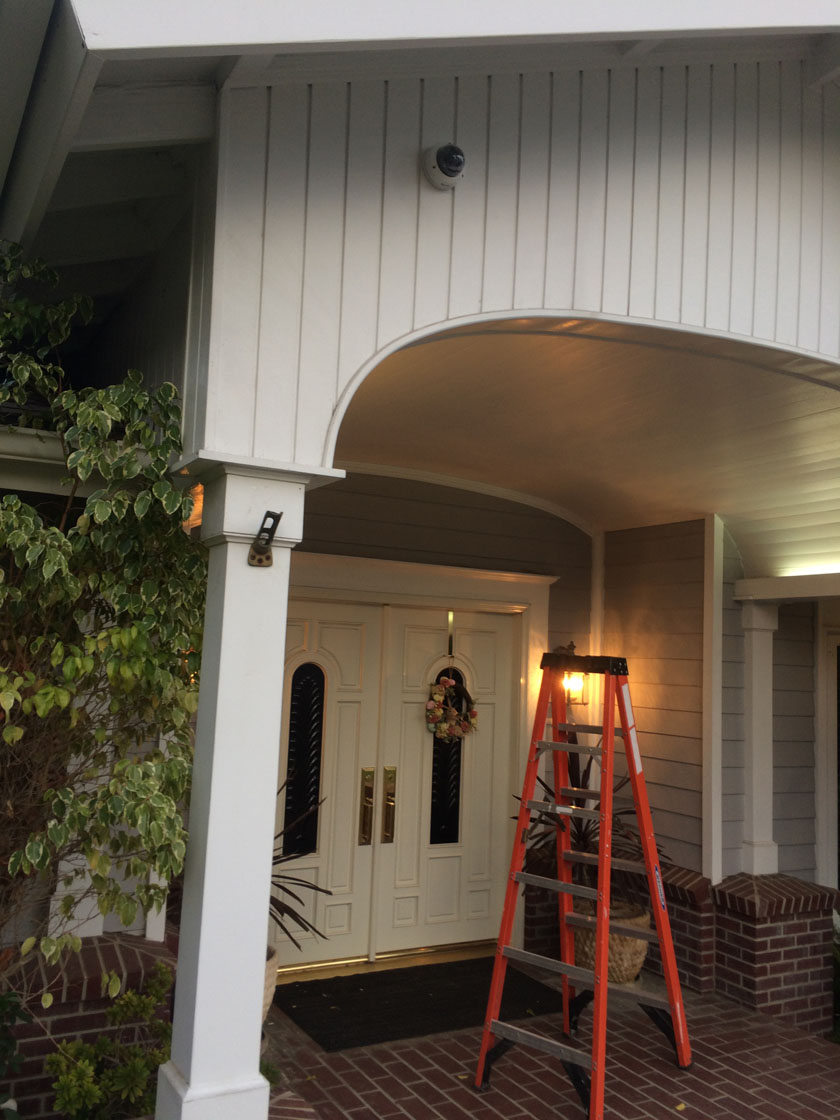
IP Security Cameras
Wired IP surveillance cameras use a Cat-5 or Cat-6 Ethernet wires to talk with your home gateway, (router) or NVR (Network Video Recorder). This type of wiring allows a broader bandwidth so more data can be transmitted faster, in high-resolution image quality that IP security cameras are well known for.
Analog Security Cameras
Analog hard-wired surveillance cameras require two separate wires, one for power and the other, a coaxial wire for video signal transmission to the DVR (Digital Video Recorder).
Let's take a look at the pros and cons of wireless CCTV security IP cameras.
Wired Security cameras - Pros
Secured connection that's extremely hard to hack.
Stable & fast data transmission.
No interference with other devices.
Hard to tamper with & Vandal proof.
Ideal for large homes or commercial use.
Wired Security cameras - Cons
Requires a professional installation, or tech savvy skills and the proper tools.
May need some work done in attic or a crawl space.
Climbing tall ladders or platforms.
Set up may be chalanging for the DIY.
Less movable.
Have questions about your home security?
Call and speak with Leo about your home security needs.
Call leo
Wireless, (WiFi) Security Cameras - Introduction.
Finally, After a long, busy day, you're at home. Behind the closed door, you've left all of the outside world threats and dangers. Now, you're feeling free to take off your guards and enjoy that sense of peace. But wait, something smells, What's that stain on the floor? And who did this? Joey or Snowey? Luckily, you can roll back time and find out. Simply launch the wireless security cameras app and run the video playback to see who's between the two puppies is one that's responsible for the incident.
How does Wireless Security Cameras work?
Relying on a WiFi connection, The data from the camera is transmitted to your home router over the home network. Wireless home security cameras aren’t used solely for security purposes anymore. Just toss it anywhere around the house and plug it to a power outlet. Then download the security camera's app on your phone and follow the setup process instructions in the quick start guide. Most companies have made the initial set up process fairly easy. All you have to do is scan the QR code and voila, you can now check on your kitten while you're at work. Remember to place the camera at a spot where the WiFi signal at your home is strong enough, and the wireless camera's video will stream straight to your phone.
battery or solar powered?
Generally, There are 3 types of wireless security cameras:
Battery poweredSolar panel powered Plugged-in,(using electrical plug).
Plugged-in wireless security cameras
Like the name suggests, a plugged-in wireless security cameras must be plugged to a power outlet in order to get powered. The communication between the camera and the home router is connected via the wireless signal.
Does wireless cameras require a subscription to a cloud storage service?
Since ther's no NVR in use, In most cases, yes. Except when your camera allows a USB flash drive or a micro SD card to store the video footage locally. Normally, the footage will be stored online to the cloud. Wireless camera manufacturers will give away a short period of cloud storage for free, but farther than that, a monthly subscription to a cloud based storage is the only way to store the footage recorded. Let's take a look at the pros and cons of wired CCTV security IP cameras.
Wireless Security cameras - Pros
Does'nt require a professional installation.
Works well for appartments and small homes.
Ideal for rentals or temporary stay.
Simple to set up.
More movable.
Wireless Security cameras - Cons
Higher risk of being hacked.
Unstable data transmission.
May slow down your home's internet speed.
Can cause interference with other devices.
Easier to tamper with.
Have questions about your home security?
Call and speak with Leo about your home security needs.
Call leo
Wired or Wireless CCTV - Which One to Choose?
After comparing the 2 types of security cameras and based on your specific needs, you should now have a better idea which one of the two systems is more suitable for you. Wired or wireless security cameras? Still not sure? read below.
Choose A Wired Security Cameras if:
You need a more secure connection. Wired security cameras are directly connected to your router, that reduces the chances of beeing hacked.
Have a large space to cover. The larger the area you have to cover, the more cameras and a stronger WiFi signal needed. Check the range of your WiFi signal in your property before making a decision.
You want a solid stable data transmission. Depended on WiFi signal, it's obvious that wireless security cameras are more prone to connectivity interuptions. Inevitably, sometimes the WiFi signal is weak or influenced by the environment. Interference caused by other radio frequencies such as a near by cell phones, micro-waves and other RF reliant devices is very likely. Different physical obstructions like thick walls and even the weather, should be taken under considuration as well. To recap, For a fluent continuous operation, buy a wired IP security camera system.
You don't want to pay monthly fees for the cloud storage.
Pick Wireless CCTV Security Cameras if:
Getting poewr to that specific location is impossible. A battery or solar powered security camera could be the solution.
You don't mind paying monthly fees for the cloud storage.
Can't afford a professional installation. Just place the camera to the position you want, and you are good to go.
You need to move the cameras around to watch the baby or a pet. Wireless cameras are easy to move around.
You need a temporary solution.
in conclusion:
Both wired and wireless security cameras have their advantages and disadvantages. The key to making the right choice, is to match the security cameras system to your specific needs. If you're still not sure what will work better for you, or you'd like to get a professional opinion, please feel free to reach out and we can chat about your own security needs. We offer a free on-site assessment and consultation. If you have any questions, let's work them out. Leave a message below and we'll be in touch with you shortly. Thank you for taking the time to read this. I hope you've enjoyed the reading and found the information handy.


